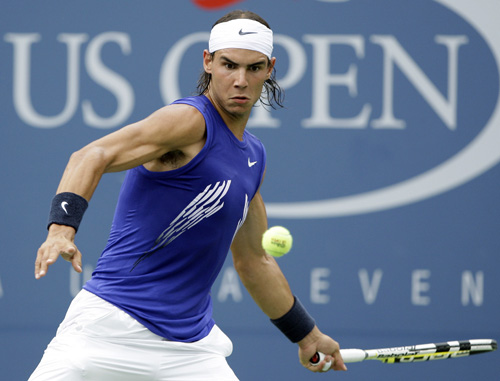Jet lag plagues US Open stars

No. 1 Rafael Nadal returns a shot to Bjorn Phau in the first round of the U.S. Open in New York on Monday. Charles Krupa, The Associated Press
August 26, 2008
NEW YORK – The rings of the Olympics are not the only ones in common for Rafael Nadal, Roger Federer and the Williams sisters.
Chances are those tennis champions also share dark circles under their eyes, courtesy of the just completed Beijing Games and cross-continent flying.
Fresh off a gold medal in men’s singles at the Olympics – jet lag notwithstanding – Nadal began his quest for his first U.S. Open title on Monday as the newly minted No. 1 player in the world.
“It was tough, because two weeks ago I went from Cincinnati to Beijing, 12 hours, and went 12 more hours (to New York),” this year’s French Open and Wimbledon champion said before facing Bjorn Phau in the first round. “It’s tough, but I don’t want to think about that.”
No, he has more important issues to worry about, such as solving Federer on a hardcourt as he finally figured out his rival on Wimbledon grass last month. Nadal is seeking his third straight Grand Slam title, though he’s never gotten past the U.S. Open quarterfinals.
Get The Daily Illini in your inbox!
Federer flamed out in singles in Beijing, but captured gold for Switzerland in doubles before heading to New York to try to defend his U.S. Open title for a fourth straight year. The extensive travel and time zone jumping has been tough, but Federer has been gearing up for it. The Olympic tournament ended last Sunday, giving even the finalists a week to get to New York and become acclimated with Eastern Daylight Time.
Of the 64 men who played singles in Beijing, 51 are also in the U.S. Open field. Likewise, 55 women are doing the double that comes along every four years.
“I’m just going to try to recover from a whole lot of traveling we’ve had,” said Federer, a 12-time Grand Slam champion. “You do a lot of prevention, you know, stretching, massage and a lot of sleep, eat healthy kind of thing.”
While Nadal had his first match Monday afternoon, Federer and Olympic women’s doubles champions Venus and Serena Williams weren’t scheduled to begin their U.S. Open singles play until Tuesday. Federer and Venus are the headliners under the lights Tuesday night, but Serena is slated for the afternoon session.
“Well, I’m still trying to get over the jet lag,” Serena said. “Venus seems like she isn’t having a problem, but I don’t handle jet lag as well as she does. Hopefully it won’t be an issue.”
Venus did, however, lose track of the days as she prepared to shoot for her third U.S. Open title.
“We got here Thursday. I really don’t know what day it is anymore,” she said Saturday. “I thought today was Friday, but I’m here at the right time.”
Elena Dementieva, the Open’s No. 5 seed and the gold medal winner in women’s singles in Beijing, was first on Arthur Ashe Stadium court just after 11 a.m. Monday and eliminated Akgul Amanmuradova 6-4, 7-5 in about 90 minutes. “Yesterday, I was trying to go to sleep, but I mean I couldn’t because I was watching the closing ceremony,” Dementieva said Monday. “You know, my mind is still there. I was trying to stay focused as possible as I could, and the court was not easy. I think the first round is never easy.”
Andy Roddick is feeling better after dealing with an injury to his right shoulder that has limited him since his loss to Janko Tipsarevic in the second round at Wimbledon on June 26.
Roddick, the 2003 U.S. Open champion, sat out the French Open because of the injury and decided to bypass Beijing to work on his hardcourt game and avoid any problems the travel could present.
Whether he gained an advantage by playing in North America remains to be seen.
Dementieva also wasn’t sure if the added matches would be a plus or minus heading into the year’s final Grand Slam tournament.
It didn’t matter, anyway. Winning Olympic gold was her biggest goal.
“I don’t know what is the best, to be a little tired but very comfortable and very positive or just to be fresh and not to play in the Olympic Games,” the 26-year-old Russian said. “It’s just another challenge, and we’ll see if I can handle it.”






